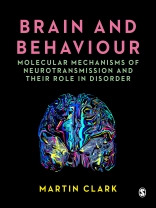Want to understand the biological processes that underpin our behaviour? Look no further!
Neurotransmitters are a core element of biological psychology and essential for the correct operation of brain circuits. This textbook focuses on eight core neurotransmitters and explores the machinery underpinning their function. This includes how they are synthesised, packaged, and facilitate communication between neurons. Each chapter focuses on a single neurotransmitter, outlining its machinery and discussing what research suggests about how the alteration of this machinery may contribute to various atypical behavioural states. This structure will help guide the reader through complex ideas in a clear and comprehensive manner.
From Dopamine to Nitric Oxide, and from Acetylcholine to Serotonin, Brain and Behaviour places specific focus on how alterations in neurotransmitters can contribute to specific atypical behaviour such as ASD, Epilepsy, Depression, and Addiction. It is essential reading for any student of neuropsychology, neuroscience, or biological psychology.
Brain and Behaviour also includes features to help enhance your understanding of neurotransmitters, such as:
- Research methods focus boxes
- Famous researcher spotlight
- Test yourself questions
Martin Clark is Lecturer in Neurobiology at the University of Central Lancashire.
Inhaltsverzeichnis
Chapter 1: An introduction to neurotransmitters and their machinery
Chapter 2: Glutamate
Chapter 3: GABA (Gamma Aminobutyric Acid)
Chapter 4: Acetylcholine
Chapter 5: Dopamine
Chapter 6: Serotonin
Chapter 7: Endogenous opioids
Chapter 8: Substance P (an example tachykinin)
Chapter 9: Nitric oxide
Chapter 10: Neurons outside the CNS and interactions between neurotransmitter mechanisms
Über den Autor
Martin Clark is a lecturer of Neurobiology in the department of Psychology and Computing at the University of Central Lancashire. He is also an associate researcher at the University of Sheffield. Martin completed his Ph D in the laboratory of Dr Enrico Bracci at the University of Sheffield. During his Ph D he employed electrophysiological methods, including multi-electrode arrays to investigate the circuit dynamics and molecular mechanisms that modulate activity within the ventral pallidum and ventral striatum. His current research interests are focused on molecular mechanisms underpinning ASD (Autistic Spectrum Disorder) and bv FTD (behaviour variant Frontal Temporal Dementia). He is particularly interested in GABAerigc interneurons and the alterations in these populations that may underpin behavioural change or act as key pre-symptomatic biomarkers. Martin is a fellow of the higher education academy and currently teaches on a range Neuroscience and Psychology courses and modules.












